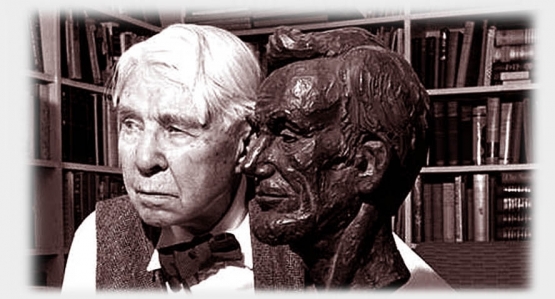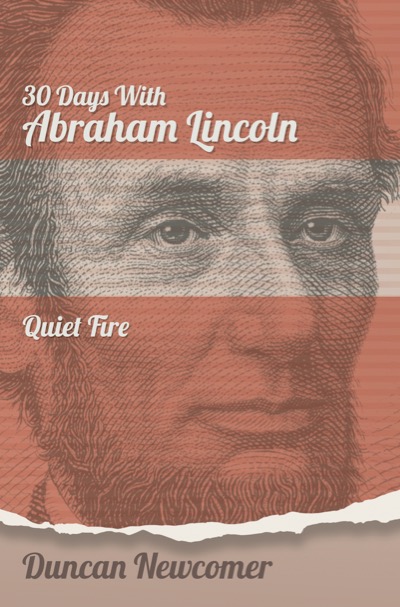By DUNCAN NEWCOMER
Host of the ‘Quiet Fire’ series
This is Quiet Fire, a reflection on the spiritual life of Abraham Lincoln and its relevance to us today. Welcome.
I have a Lincoln quote for you from The Prairie Years, the opening of poet Carl Sandburg’s multi-volume, Pulitzer-Prize-winning reflection on Lincoln’s life. This is how Sandburg described the spiritual foundations of Nancy Hanks, Lincoln’s “Sweet Angel Mother”—
It could be that she was sad with sorrows like dark stars in blue mist, with hopes burned deep in her that beyond the everyday struggles, the babble and gabble of today, there might be what her brightest dreams told her. She read their Bible. One who knew her said she was a “ready reader.” She was a believer and knew—so much of what she believed was yonder—always yonder. Every day came cooking, keeping the fire going, scrubbing, washing, patching, with little time to think or sing of the glory she believed in—always yonder.
Certainly Nancy Hanks—who died when her son was only 9—was shaped by the revivals that swept west across America in the beginning of the 1800s. Some called this wave another Great Awakening, some felt it was the very Kingdom of God in America. As Sandburg tells the story, the perpetually overworked Nancy Hanks simply thought of it as a faith in “yonder.”
Yonder is a spiritual word whose time has come again. It is a word like other spiritual nouns—like bliss, grace, enlightenment, beatitude. These words are almost verbs because they carry such life, words that as nouns hardly cover the state of being that they refer to. They can be adjectives and adverbs.
Yonder is a mix of vision—horizons—like the prairie lands that stretch out to the edge of the sky, like the ocean of land that the prairie is, and wonder. In the mix of vision and wonder, Yonder becomes an envisioned and visionary place.
Remember Carol King’s “way over yonder”?
A way over yonder
Is a place I have seen
In a garden of wisdom
From some long ago dream
Yonder is a feeling, a wonder, like the story-book awe that greets the little animals at the edge of the riverbanks under the Wind in the Willows, when morning light comes and the sound of the flute of the great God Pan floats over their little ears. Yonder is like that awe. A natural holiness.
Yonder is when the hopes of a people are believed in so much they go beyond themselves to achieve what is then called glory.
Do you remember that word, “glory,” at the close of Sandburg’s passage? He admits that Hanks’ real aim was “the glory she believed in—always yonder.”
That’s the meaning in title of the 1989 film Glory about the Black soldiers of the Massachusetts 54th regiment who tried to take South Carolina’s Fort Wagner—in an even larger battle to prove that Black lives matter.
So glory is that place where politics and the real struggles of people mixes with values and vision.
That is the vision involving the spirit of yonder that Lincoln grew up with, and never lost.
This is Quiet Fire, the spiritual life of Abraham Lincoln.
.
.
.
 Care to Enjoy More Lincoln Right Now?
Care to Enjoy More Lincoln Right Now?
GET A COPY of Duncan’s 30 Days with Abraham Lincoln—Quiet Fire.
Each of the 30 stories in this book includes a link to listen to the original radio broadcasts. The book is available from Amazon in hardcover, paperback and Kindle versions. ALSO, you can order hardcover and paperback from Barnes & Noble. In addition, our own publishing house offers these bookstore links to order hardcovers as well as paperbacks directly from our supplier.
.
- Duncan Newcomer’s Abraham Lincoln Quiet Fire 4: The courage to say—’In spite of all this, I will be!’
- Duncan Newcomer’s Abraham Lincoln Quiet Fire 1: In this cruel month of death, what will be our legacy?
- Duncan Newcomer’s Abraham Lincoln Quiet Fire 2: Coping with the Uncertainty and Mystery of a Deadly Disease
- Duncan Newcomer’s Abraham Lincoln Quiet Fire 3: We Must Rise with the Occasion
- Duncan Newcomer’s Abraham Lincoln: When will we be good? God knows!
- Duncan Newcomer’s Abraham Lincoln Quiet Fire 6: Lincoln’s Courage to Judge and to Lament
- Duncan Newcomer’s Abraham Lincoln Quiet Fire 7: Lincoln looks toward his spiritual hero, Washington
- Duncan Newcomer’s Abraham Lincoln Quiet Fire 8: Four Score and Seven
- Duncan Newcomer’s Abraham Lincoln Quiet Fire 9: A Unique Spiritual Quest and The Pilgrim’s Progress
- Duncan Newcomer’s Abraham Lincoln Quiet Fire 10—When all three meet: Lincoln, black people and the Bible.
- Duncan Newcomer’s Abraham Lincoln Quiet Fire 11—Raising a Flag and Contemplating the Sacred Pillars of America
- Duncan Newcomer’s Abraham Lincoln Quiet Fire 12—Why do we refer to our most eloquent president as ‘Quiet’?
- Duncan Newcomer’s Abraham Lincoln Quiet Fire 13—Ultimately, we are responsible for our faces.
- In Our Struggle for Freedom, the Truth is Not in Our Statues—It’s in Our Souls
- Duncan Newcomer’s Abraham Lincoln Quiet Fire 16—In racial justice, ‘We … bear the responsibility.’
- Duncan Newcomer’s Abraham Lincoln Quiet Fire 17—Remembering Mrs. Keckley, a close friend who Lincoln realized he did not truly know
- Duncan Newcomer’s Abraham Lincoln: Remember when a president’s 1st value was Kindness?
- Abraham Lincoln Quiet Fire 19—’The election was a necessity’
- Duncan Newcomer’s Abraham Lincoln Quiet Fire 20—’A Most Sacred Right’
- Duncan Newcomer’s Abraham Lincoln Quiet Fire 21—Locating the spiritual X-factor in Lincoln’s ground-breaking life
- Duncan Newcomer’s Abraham Lincoln Quiet Fire 22—Lincoln shows us the power of holding even opposites together
- Duncan Newcomer’s Abraham Lincoln Quiet Fire 23—The forest vision Lincoln shared with poet Rabindranath Tagore
- Duncan Newcomer’s Abraham Lincoln Quiet Fire 24—Myths and wisdom in national conversation about rule of law
- Duncan Newcomer’s Abraham Lincoln Quiet Fire 25—How a true leader expresses the nation’s grief
- Duncan Newcomer’s Abraham Lincoln Quiet Fire 26—Choosing Humility over Humiliation
- Duncan Newcomer’s Abraham Lincoln Quiet Fire 27—What shaped Lincoln’s soul?
- Duncan Newcomer’s Abraham Lincoln Quiet Fire—Here’s to you Mrs. Robinson!
- Duncan Newcomer’s Abraham Lincoln Quiet Fire—Now, we’re all hoping for ‘Yonder’
- Duncan Newcomer’s Abraham Lincoln Quiet Fire—In three words, he said it: ‘We are elected.’
- Duncan Newcomer’s Abraham Lincoln Quiet Fire—Let’s remember how he reached across the aisle to discover new friends
- Duncan Newcomer’s Abraham Lincoln Quiet Fire—Marking the anniversary of those 272 words at Gettysburg
- Duncan Newcomer’s Abraham Lincoln Quiet Fire—’The Last Best Hope of Earth’
- Duncan Newcomer’s Abraham Lincoln Quiet Fire—’A Christmas Carol’ with Abraham Lincoln


